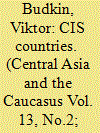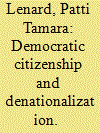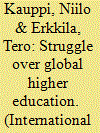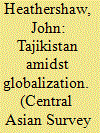|
|
|
Sort Order |
|
|
|
Items / Page
|
|
|
|
|
|
|
| Srl | Item |
| 1 |
ID:
118735


|
|
|
|
|
| Publication |
2012.
|
| Summary/Abstract |
December 1991 marked the beginning of a grandiose experiment whose purpose was to establish a whole group of independent states in the territory of a world giant known as the U.S.S.R., which occupied one-sixth of the Earth. Their establishment was based on the negation of the previous Soviet model providing for the domination of one party, which had imposed a no-choice ideology on the society, and for the administrative command system of politics and economics.
|
|
|
|
|
|
|
|
|
|
|
|
|
|
|
|
| 2 |
ID:
158489


|
|
|
|
|
| Summary/Abstract |
Are democratic states permitted to denationalize citizens, in particular those whom they believe pose dangers to the physical safety of others? In this article, I argue that they are not. The power to denationalize citizens—that is, to revoke citizenship—is one that many states have historically claimed for themselves, but which has largely been in disuse in the last several decades. Recent terrorist events have, however, prompted scholars and political actors to reconsider the role that denationalization can and perhaps should play in democratic states, in particular with respect to its role in protecting national security and in supporting the global fight against terror more generally. In this article, my objective is to show that denationalization laws have no place in democratic states. To understand why, I propose examining the foundations of the right of citizenship, which lie, I shall argue, in the very strong interests that individuals have in security of residence. I use this formulation of the right to respond to two broad clusters of arguments: (1) those that claim that it is justifiable to denationalize citizens who threaten to undermine the safety of citizens in a democratic state or the ability of a democratic state to function as a democratic state, and (2) those that claim that it is justifiable to denationalize dual citizens because they possess citizenship status in a second country that is also able to protect their rights.
|
|
|
|
|
|
|
|
|
|
|
|
|
|
|
|
| 3 |
ID:
108241


|
|
|
|
|
| Publication |
2011.
|
| Summary/Abstract |
This article examines the intensification, since the creation of the so-called Shanghai list of world universities in June 2003, of a political struggle in which a variety of actors, universities, national governments, and, more recently, supranational institutions have sought to define global higher education. This competition over global higher education has highlighted issues such as the internationalization and denationalization of higher education, the international mobility of students, the role of English language as the language of science, and the privatization of higher education. In contrast to IPE or Marxist analyses, we analyze the symbolic logic of ranking lists in higher education, their uses, and the European Commission's initiative to create an alternative world university classification (see World Social Science Report, UNESCO Publishing; Europa zwischen Fiktion und Realpolitik/L'Europe-Fictions et réalités politiques, Transcript for analysis). This initiative represents a political move in a process of rapid restructuration of higher education at the global level.
|
|
|
|
|
|
|
|
|
|
|
|
|
|
|
|
| 4 |
ID:
104069


|
|
|
|
|
| Publication |
2011.
|
| Summary/Abstract |
This paper considers the nature of Tajikistani statehood in an era of globalization. It takes as its foil a recent report of the International Crisis Group, 'Tajikistan: on the road to failure'. The paper interrogates this claim and finds that it is based on a poor conceptualization of the state which disregards advances in state theory made in the last two decades. However, this problematic declaration cannot simply be dismissed but, being from an authoritative source, must be considered for its constitutive functions for Tajikistani statehood. The paper thus considers Tajikistan's position in world politics theoretically in terms of the sociological and anthropological literature on global assemblages, particularly Sassen's concept of denationalization. It goes on to investigate a single case of the contemporary Tajikistani state: the state-owned Tajik Aluminium Company's (Talco) international trading arrangements and tolling agreements. The paper argues that the post-Soviet, post-conflict Tajikistani state is not simply captured by elite networks or a shell for the personnel of the regime. Rather, whilst an explicitly 'nationalizing state', it has been transformed along the lines of denationalization. Tajikistan's official institutions, in cooperation with global actors from multinational corporations to donor agencies, have been incorporated within certain global economic and political assemblages. The paper discusses the implications of all this in terms of the consequent hollowing out of the national-territorial state model and the establishing of lines of economics and politics which make the state, in parts, global.
|
|
|
|
|
|
|
|
|
|
|
|
|
|
|
|
|
|
|
|
|